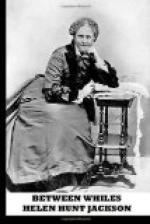“And I not his brother till he gets a civiller tongue in his head,” said John.
“It is not to be brother I haf him brought,” interrupted the old man. “Alvays you vimmen are too soon; it may be he are goot, it may be he are pad; I do not know. It is to vork I haf him brought.”
“Yes,” echoed Frau Weitbreck; “we do not know.”
It was not so easy as Carlen and her mother had thought, to be like mother and sister to Wilhelm. The days went by, and still he was as much a stranger as on the evening of his arrival. He never voluntarily addressed any one. To all remarks or even questions he replied in the fewest words and curtest phrases possible. A smile was never seen on his face. He sat at the table like a mute at a funeral, ate without lifting his eyes, and silently rose as soon as his own meal was finished. He had soon selected his favorite seat in the kitchen. It was on the right-hand side of the big fireplace, in a corner. Here he sat all through the evenings, carving, out of cows’ horns or wood, boxes and small figures such as are made by the peasants in the German Tyrol. In this work he had a surprising skill. What he did with the carvings when finished, no one knew. One night John said to him,—
“I do not see, Wilhelm, how you can have so steady a hand after holding the sickle all day. My arm aches, and my hand trembles so that I can but just carry my cup to my lips.”
Wilhelm made no reply, but held his right hand straight out at arm’s length, with the delicate figure he was carving poised on his forefinger. It stood as steady as on the firm ground.
Carlen looked at him admiringly. “It is good to be so steady-handed,” she said; “you must be strong, Wilhelm.”
“Yes,” he said, “I haf strong;” and went on carving.
Nothing more like conversation than this was ever drawn from him. Yet he seemed not averse to seeing people. He never left the kitchen till the time came for bed; but when that came he slipped away silent, taking no part in the general good-night unless he was forced to do so. Sometimes Carlen, having said jokingly to John, “Now, I will make Wilhelm say good-night to-night,” succeeded in surprising him before he could leave the room; but often, even when she had thus planned, he contrived to evade her, and was gone before she knew it.
He slept in a small chamber in the barn,—a dreary enough little place, but he seemed to find it all sufficient. He had no possessions except the leather pack he had brought on his back. This lay on the floor unlocked; and when the good Frau Weitbreck, persuading herself that she was actuated solely by a righteous, motherly interest in the young man, opened it, she found nothing whatever there, except a few garments of the commonest description,—no book, no paper, no name on any article. It would not appear possible that a man of so decent a seeming as Wilhelm could have come from Germany to America with so few personal belongings. Frau Weitbreck felt less at ease in her mind about him after she examined this pack.




